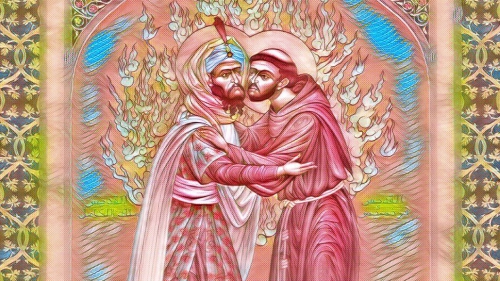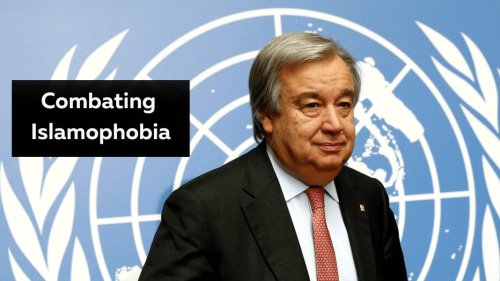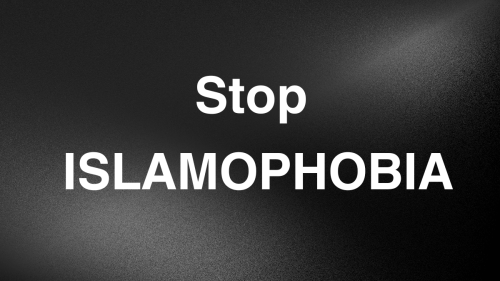The Story of Islamophobia

Summary: This article outlines the origins and evolution of Islamophobia. It firstly explains the context in which the seeds of the problem were planted. That is followed by the reasons for which Islam and Muslims historically became easy targets. After that, three critical evolutionary phases, as well as illustrations, of Islamophobia were presented: the First Crusade and Pope Urban II; “The Divine Comedy” by Dante Alighieri; and “Mahomet” by Voltaire. The article is concluded with thoughts on Islamophobia at the present time.
When Heraclius, the Byzantine Emperor (d. 641), met in Jerusalem Abu Sufyan, who was the leader of Makkah at the time and was yet to accept Islam, he enquired a great deal of information about Prophet Muhammad (pbuh). In doing so, he insisted that he wanted nothing but the truth, regardless of Abu Sufyan’s personal perception of, and relationship with, the Prophet (pbuh) (Sahih Muslim).
This Heraclius’ position of curiosity, fervor and affability represented a pattern, which was similarly shared by the sizeable Christian community of Najran, a southwestern region in the Arabian Peninsula.
When the reputation and role of Negus, the King of Christian Abyssinia – who eventually became a Muslim himself - are added to the mix, one can easily understand why especially early Muslims had a positive perception about Christians. They were favored above pagans and nonbelievers. They were regarded as the People of the Book.
The feeling was reciprocal. The Qur’an affirms: “You will surely find the most intense of the people in animosity toward the believers (to be) the Jews and those who associate others with Allah; and you will find the nearest of them in affection to the believers those who say: ‘We are Christians’. That is because among them are priests and monks and because they are not arrogant” (al-Ma’idah, 82).
The context
However, as the contacts between Islam and Christendom (Western and Eastern Christianity) intensified, the former was increasingly seen as a serious threat to the territorial and ideological integrity of the latter. The relationships mainly from the side of Christianity were becoming more and more political, dogmatic and duplicitous, and less and less pure religious, reverential and humane.
This was coupled with the endless troubles that were besetting the Roman Empire and Christianity as its state religion. Firstly, there was a permanent fallout from the collapse of the Western Roman Empire in 476. Then there were the First (726-787) and Second (814-842) Byzantine Iconoclasm, the Great Schism in 1054, the Protestant Reformation in the 16th and 17th century (1517-1648), the Counter-Reformation (1545-1648), the European wars of religion or Christian religious wars in the 16th, 17th and 18th century.
The processes culminated in the Age of Enlightenment (the Age of Reason) in the 17th and 18th century when the authority of absolute monarchies and the rigid and irrational dogmas of the Catholic Church were greatly undermined. The sovereignty of reason and liberty were exalted instead.
The new developments paved the way for the emergence of political revolutions. The French Revolution in 1789-1799 was the epitome of the changes. In many ways it altered the course of human history, causing a chain reaction of nationalism and freedom movements, as well as revolutions, which were either inspired by it or were reactions against it.
As the incubator of ideas, ingenuity and nonconformity, the Age of Enlightenment was followed roughly by the “mature” ages of modernity and post-modernity. Such were the times when liberalism, freedom, secularism, democracy, nationalism, material progress, agnosticism, and relativism, in various forms and degrees, commenced to reign supreme.
Religion, both as an idea and actual reality, was at its deathbed. “God is dead”, Friedrich Nietzsche (d. 1900) declared, implying that the latest phases of human social and intellectual development have done away with the possibility of the existence and God. People were no longer in need of Him. The myths of religion were destroyed once and for all.
In the midst of all this, the extraordinary rise and spread of Islam and its culture and civilization worldwide, including the advances into the heart of Europe and the fall and complete takeover of the Byzantine Empire, were always to be misconstrued.
Christianity represented all religions (to most people, nonetheless, it was the only religion). With its virtual death, all systems of thought and practice that operated under the standard of religion, were dead too. Islam, in the West either as a sect of an established religion or a pseudo-religion, was no exception.
Islam and Muslims as easy targets
Islam and Muslims were expectedly vilified at all levels of their religious and national presence. They were unwelcome disturbances and evil, which simply refused to go away. Thus, pursuing the ideological and historical truths was not on the agenda of the predominantly Christian West. Other interests prevailed, and revenge was never off the table.
Consequently, Islam was seen as a form of heresy and Prophet Muhammad (pbuh) as a false prophet inspired by the devil. The Prophet (pbuh) was labelled with all the antitheses of Jesus and his message of peace, love and tolerance.
The views gradually morphed from mere categorizations to elaborate polemics. The Prophet (pbuh) became less of an impostor and heretic, and more of a servant of Satan and the Antichrist who is Hell-bound. He was the evil leader of the evil ideology which was after all other ideologies (religions). His teachings produced generations of blinded fanatics who could not spread the bigoted ideas of theirs except with the sword.
Like so a license was granted to whoever was inclined to preach anything against Islam and its Prophet, or to do anything against the interests of Muslims. Literally everything was acceptable and encouraged. No wrong could have been committed because Satan and the Antichrist, and their devotees, were difficult to handle. Doing so furthermore was a sign of piety and a holy struggle, and was fast becoming fashionable. An entire body of literature was produced in the process.
Needless to say that the sentiment was most vigorously promoted during the times of corrupt religious and political leaders. The more fraudulent they were, the more severe their campaigns were. Maligning Islam, Muslims and the Prophet (pbuh) was used as a smokescreen behind which the real stories unfolded.
The First Crusade and Pope Urban II
For example, the First Crusade (1096-1099), aimed to wrest the Holy Land from the Islamic rule and to liberate the eastern churches, was initiated by Pope Urban II (d. 1099). The Pope promised forgiveness of all sins for those who would participate in his divine call. Valor and ruthlessness were the requirements.
The results were widespread massacres and bloodbaths. They involved men, women and children. The figures were staggering. Generally during the tenure of his papacy (1088-1099), the Pope was responsible for sanctioning, directly or indirectly, so many slaughters in the name of religion - not just as part of the First Crusade in the Holy Land, but also elsewhere as part of other undertakings - that the number of victims run into millions of persons.
For some, therefore, Pope Urban II was “the benchmark for where the wrongdoings against mankind and God got to be genocidal”. He is also described as one of the worst popes who inscribed the pages of history for all the wrong reasons (www.infotainworld.com).
The massacres connected with the First Crusade were not insanity, nor the acts of bloodthirstiness, but were the results of a clear policy. “They (Christian Crusaders) desired that this place (Jerusalem), so long contaminated by the superstition of the pagan inhabitants (Muslims and Jews), should be cleansed from their contagion” (Michael Hull).
Pope Urban II’s banner was the all-out holy war against Islam. That the war was a premeditated long-term strategy, testifies the fact that there were afterwards at least seven more major Crusade expeditions. They lasted until 1291. It is estimated that in total between three and nine million people lost their lives in those wars (www.apholt.com).
Crusades as a paradigm
In actual fact, the wars never ended. They only fluctuated in terms of form, intensity and scope. Hence, centuries-old colonization and westernization signified an extension, as well as an adaptation, of the trend. As delicately do today’s Western efforts of modernization, democratization, globalization, acculturation and integration, both in the Muslim world and back home in the West.
Accordingly, when Field Marshall Allenby (re)captured Jerusalem in 1918 in the name of the Allies, while standing on the steps of the Dome of the Rock, he made a proclamation: “Today the Crusades have come to an end.” In the same vein, Peterson Smith, in his book on the life of Jesus, wrote: “This capture of Jerusalem was indeed an eighth (or ninth) Crusade in which Christianity had finally achieved its purpose” (Husayn Haykal).
The recent wars in the Middle East furthermore reinforce the point. They were never seen legitimate in the eyes of the Muslim mainstream. Rather, they were perceived – and rightly so - as the latest crusade drives against Islam and Muslims globally. The term “crusade,” with a variety of tinges, regularly reverberated from both sides of the spectrum.
Following the end of physical colonization, Muslims were gaining a significant foothold in regional and global socio-economic arenas. That was neither expected nor desired in the eyes of the former colonizers, calling for the tide to be stemmed. The rampant and globalized Islamophobia phenomenon is a product of such efforts. Extremely fluid, lethal and subtle, it in itself is a crusade.
“The Divine Comedy” by Dante Alighieri
Another example that must be mentioned is the poem “The Divine Comedy” by Dante Alighieri (d. 1321), a renowned Italian poet. In it, Prophet Muhammad (pbuh) is depicted as the greatest falsifier and a Christian schismatic, “a sower of scandal and schism”. His punishment – as presented in the poem - literally embodies the sin of discord by having his body torn apart from chin to buttocks.
The Prophet (pbuh) is not only doomed to Hell, but also placed near its very bottom where Satan himself resides. There is as well reference to Ali b. Abi Talib – “cleft in the face from forelock unto chin” - Ibn Sina, Ibn Rushd and Salahuddin al-Ayyubi, as inhabitants of Hell.
According to Edward Said, “the discriminations and refinements of Dante’s poetic grasp of Islam are an instance of the schematic, almost cosmological inevitability with which Islam and its designated representatives are creatures of Western geographical, historical, and above all, moral apprehension. Empirical data about the Orient or about any of its parts count for very little; what matters and is decisive is what I have been calling the Orientalist vision.”
The perceptions are “fixed in a visionary cosmology - fixed, laid out, boxed in and imprisoned, without much regard for anything except their ‘function’ and the patterns they realize on the stage on which they appear”.
Dante’s work is an evidence of how strongly articulated the representations of the Orient (Islam and Muslims) were, how inordinately careful their schematization was, and how dramatically effective their placing in Western imaginative geography was (Edward Said).
In spite of everything, Dante’s “The Divine Comedy” is still regarded as one of the greatest works of world literature; however, it is obvious by whom, in what academic circles, and for which precast consciousness. At any rate, the “Comedy” becomes a tragedy when certain Muslims and certain Muslim educational institutions, in the name of modernization and progress, start to follow suit and extol this devilish work.
In Egypt, as an example, there is a Dante Alighieri Institute. It was established in 1896, seven years after it was first established in Rome, with the objective of preserving and spreading the Italian language and culture in the world. It has offices in Cairo, Alexandria and Suez. For the seventh centenary of the birth of Dante Alighieri, the Institute has published in Cairo in 1965 the Arabic edition of the poet’s life and works.
“Mahomet” by Voltaire
“Mahomet” (“Fanaticism, or Mahomet the Prophet”) is a five-act tragedy, or drama, composed by French author, historian and philosopher Voltaire (d. 1778). The subject of the work is religious fanaticism.
Voltaire was “inspired” by his “love of mankind and the hatred of fanaticism.” Those virtues which adorned the King of Prussia Frederick the Great (d. 1786) – as a symbol of European secular dynamism and progress – but were non-existent elsewhere, guided the pen of Voltaire.
The Prophet (pbuh), his mission and his followers were chosen to be satirized and denigrated because they epitomized superstition, evil and fanaticism. They were a poison that still subsisted. They were a plague that still broke out from time to time, enough to infect the earth.
The Prophet (pbuh) likewise was a founder of superstition and extremism. He was a ruffian who first carried the sword to the altar to sacrifice all those who refused to embrace his doctrines.
In the said drama, he is explicitly depicted as a deceitful impostor, merciless tyrant, cunning manipulator, indoctrinator, and as suffering from obsessive love disorder.
The drama, essentially, oozes the spirit of the Age of Enlightenment and Reason, which Voltaire very much exemplified, with France being one of its European epicenters. The essence of Christianity is neither present nor endorsed, which is understandable, in that Voltaire was known for his criticism of Christianity in general and of the Roman Catholic Church in particular.
More accurately, one can read between the lines the endorsement of the fundamental principles of the Enlightenment, such as free will, liberty, equality, honor, justice, curiosity and humanity. Such was done against the backdrop of religious sentiments - albeit specifically the Islamic ones - which in no way were compatible with the ideals of the Enlightenment.
No surprise that Emanuel Kant (d. 1804) - in passing - designated the Enlightenment as man’s emergence from his self-imposed nonage, which is the inability to use one’s own understanding without another’s guidance. “Have the courage to use your own understanding”, is therefore the motto of the Enlightenment. Kant reckoned that the public use of one’s reason must be free at all times without religious interference and restrictions by means of fixed doctrines, “and this alone can bring enlightenment to mankind”.
The case of the waning Christianity was targeted too in the drama, but the case of Islam and the Prophet (pbuh) was the main focus. That was so because the days of their wickedness never died; the flames of their fanatical religious wars were never totally extinguished; their threat was real, even though they might not have functioned so openly; and the symptoms of their scourge still managed to intermittently break out and trouble the world.
Voltaire concluded that those who underestimated the threat of Islam and its Prophet’s zealous followers were paying “too high a compliment to human nature”. Therefore, he had no choice but to project the action of his literary work as terrible as possible. “I do not know whether horror was ever carried farther on any stage.” If allowed, though, the proponents of such wickedness and fanaticism can perpetrate more horrible actions “than that which I have invented”.
Voltaire was a defender of freedom and secularism as an emergent and most precious windfall of European struggles. The ongoing battles were for the future, as a result of which the weakening Christianity was increasingly side-lined, whereas the immortality and innate potency of Islam were the real cause for concern. And so, they had to be dealt with as such on all fronts.
Need for political and religious support
Nonetheless, for Voltaire’s excessive ideas to gain currency and be widely accepted, he needed both political and religious support. His poem was set to divide opinion. Napoleon for one is said to have somewhat disapproved of the author’s portrayal of the Prophet (pbuh), accusing him of departing “both from nature and history”.
As a consequence, Voltaire wrote a letter to the powerful King of Prussia Frederick the Great (d. 1786), turning his eyes towards his court “like the pilgrims of Makkah turning their eyes perpetually towards that city after leaving it.” He did so while sending the King a fresh copy of “Mahomet,” having earlier sent him the sketch of the same.
Voltaire warned the King and, at the same time, sought his support, together with a possible intervention, against the existent enemy that was putting at risk everything the secular Europe was building for ages.
He described the problem as follows: “In vain does human reason advance towards perfection, by means of that philosophy which of late has made so great a progress in Europe; in vain do you most noble prince, both inspire and practice this humane philosophy; whilst in the same age wherein reason raises her throne on one side, the most absurd fanaticism adorns her altars on the other.”
Voltaire hoped that some “weak mortals who are ever ready to receive the impressions of a madness foreign to their culture” will benefit from his work by guarding themselves against the explained fatal delusions, and against blindly following the blind who cry out to them and who hate and persecute all who are rash enough not to be of the same opinion even in matters people do not understand.
Voltaire concluded his letter to King Frederick the Great by declaring that it would be an infinite service to mankind (not merely to Europe) to eradicate such false sentiments (and their sources). He then professed that what he had written he knew was his majesty’s opinion as well, on account of him being an agnostic and a great patron of the arts, education and generally all the standards and values of the Enlightenment.
Parenthetically, the King is reported to have been homosexual. He was also a religious sceptic, tolerating all religions and faiths in his kingdom. However, Islam and Muslims belonged to the sphere of the “other” and hence were part of the “us versus them” dialectics. The King once commented that he was fortunate to have lived in the age of Voltaire, to have known him and have corresponded with him.
Moreover, Voltaire wrote to Pope Benedict XIV (d. 1758), greatly flattering him. He described him as the head of the true religion and the vicar as well as representative of a God of truth and mercy. He informed him of his satire against the founder of a false and barbarous sect, who in reality was a false prophet propagating cruelty and errors.
He asked for the Pope’s permission to lay at his feet both a specimen of the satire and the author of it, humbly requesting his protection of the former and his benediction (approval and blessing) upon the latter.
The Pope replied to Voltaire that he was favored with his excellent tragedy of Mahomet, which he had read with great pleasure.
The Pope next wrote: “Many are the obligations which you have conferred on me, for which I am greatly indebted to you, for all and every one of them; and I assure you that I have the highest esteem for your merit, which is so universally acknowledged.”
At last, the Pope promised that he will defend the work “against your opposers and mine, and here (I) give you my apostolical benediction”.
The Pope mentioned “your opposers and mine” most probably because he too was often a target. He was a polymath that was somewhat inclined to streamlining and even reforming the Catholic Church. He promoted scientific learning and the baroque arts, was conciliatory in his relations with the secular powers making vast concessions to the kings, and was moderate but committed to the Counter-Reformation (authentic Catholic teachings) (Britannica).
“Mahomet” is therefore said to have been dedicated by the author to the Pope.
It stands to reason that Voltaire’s “Mahomet” marked a transition point from religious to secular Islamophobia. The satire represented the diminishing power and scope of the former, and the fast rising proclivity and compass of the latter. The transition from one style to another was as much systematic as spontaneous.
Islamophobia today
Indeed, every subsequent Islamophobe owes a great deal of gratitude to Voltaire and his “Mahomet.” Unfortunately, the author’s global reputation made his Islamophobic views globally appealing too. He is sometimes regarded as the most outstanding literary figure of modern times, and possibly of all times.
All but particularly secular Islamophobes are Voltaire’s “descendants,” including a great many contemporary leaders in his native France. Some thus wonder if he actually spread the Enlightenment or darkness, colonization and enslavement.
The factors that cause and sustain Islamophobia are ignorance, hatred, enmity, and religious (ideological) bigotry. In any case, to advocate Islamophobia nowadays, in the age of globalization, democracy, internet, and the information age, means that those factors have been elevated to some unprecedented levels, bordering on paranoia, irrationality, madness and fantasy.
Islamophobia is as incomprehensible as the deeds of Islamophobes. It stops at nothing in order to achieve a result, commanding no fixed patterns, nor strategies. It persistently strives to enrich and embolden itself by bringing whoever and whatever it can to its fold - in part or completely, actually or virtually. It preys on the “vulnerable,” doubtful and embittered ones, recognizing no value, respect or consequence whatsoever in the process. It is shameless.
This explains, for instance, why Pope Benedict XVI – who was not an Islamophobe by any stretch of the imagination, but was not an angel either, as his relations with Muslims were tense at times - in a lecture of his in 2006 controversially said, quoting a 14th century Christian emperor Manuel II: “Show me just what Muhammad brought that was new and there you will find things only evil and inhuman, such as his command to spread by the sword the faith he preached.”
As pessimistic as it may seem, but the ongoing Muhammad cartoon controversy in France, plus a long list of ideologically and politically motivated tensions globally, do not bode well for the future. However, that is what life exactly is: a perennial confrontation between the truth and falsehood.
Only misguided ones expect it to be different.
Topics: Byzantine Empire, Crusades, Islamophobia
Views: 4538
Related Suggestions

















